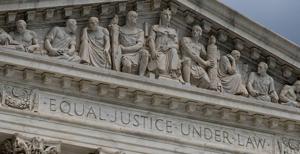(The Center Square) – With the Jan. 1 deadline to register banned firearms approaching, Illinois has responded to a challenge of its gun and magazine ban in the U.S. Supreme Court.
Meanwhile, a separate gun ban challenge at the nation’s high court has been forwarded to the full court’s conference next month.
Illinois enacted a ban on more than 170 semi-automatic firearms and magazines over certain capacities on Jan. 10. The law also requires those with grandfathered firearms now banned to register them with Illinois State Police by Jan. 1. Failure to comply could lead to felony charges. ISP’s second notice emergency rules for the registry were filed this week to the Joint Committee on Administrative Rules.
A week after the law was enacted, legal challenges were filed in both state and federal court. Two of those cases are now in front of the U.S. Supreme Court for possible review.
After the Northern District of Illinois sided with the state earlier this year in several cases, plaintiffs went to the Seventh Circuit U.S. Court of Appeals where the case was consolidated with other challenges, including consolidated cases out of the Southern District of Illinois where a preliminary injunction was granted. Last month, the majority opinion of the Seventh Circuit three-judge panel vacated the Southern District’s preliminary injunction and said the state had a likelihood of advancing on the merits.
Representing Robert Bevis of Law Weapons out of Naperville in their case challenging the state and city’s gun ban, National Foundation for Gun Rights Executive Director Hannah Hill said a full appeals court review is not guaranteed.
“So, the fact that we have in hand a Seventh Circuit ruling that is outright defiant of not just one but two [U.S.] Supreme Court precedence on the Second Amendment, we think is a very compelling case for the Supreme Court,” Hill told The Center Square.
After the three-judge panel’s ruling, the Seventh Circuit denied a motion for a preliminary injunction pending a full appeals court review or further action to the U.S. Supreme Court. Bevis then took the case to the U.S. Supreme Court Nov. 27.
Plaintiffs said the majority of the three-judge panel incorrectly held that banned firearms are not arms, that the common use test is faulty, that the court misinterpreted recent U.S. Supreme Court precedent from New York State Rifle and Pistol Association v. Bruen, that the court’s decision “rests on stealth interest balancing,” and that an arm may be banned “because it is similar to a weapon formerly used by the military.”
On Nov. 30, Justice Amy Coney Barrett gave the state until Wednesday evening to respond to a motion for an injunction pending review.
At the prospect of an emergency injunction pending review preventing the state’s gun ban from being enforced, Gov. J.B. Pritzker was confident, yet concerned.
“I think in the long run that we will win in the [U.S.] Supreme Court but are we concerned, always a little bit, because you never know what the outcome will be,” Pritzker said Monday.
In Wednesday’s filing arguing a motion for an emergency injunction pending review be denied, the state said that among other things the plaintiffs have not shown circumstances warranting such action.
“Indeed, their conduct suggests otherwise: applicants waited nearly three weeks after the Seventh Circuit issued its decision to seek an injunction from that court,” the state said. “The balance of equities and public interest also favor denying the application.”
Separately, the challenge against Illinois’ gun ban that also raises conflict of interest concerns around the Illinois Supreme Court has advanced at the U.S. Supreme Court. Wednesday, Justice Amy Coney Barrett distributed Caulkins’ case to the full U.S. Supreme Court for possible consideration at their conference Jan. 5.
That case stems from state Rep. Dan Caulkins, R-Decatur, who challenged the gun ban in state court. After getting final judgement in Macon County, the state appealed to the Illinois Supreme Court. Caulkins motioned for two Illinois Supreme Court justices to recuse themselves after their political campaigns received a million dollars from Gov. J.B. Pritzker and sizable contributions from House Speaker Emanuel “Chris” Welch, D-Hillside, and a fund connected to Senate President Don Harmon, D-Oak Park. All three are key defendants in the case and leaders of two of the three branches of government, the executive and the legislative.
Earlier this year, Pritzker downplayed the appearance of a conflict with the judicial branch because of his contributions.
“These are independent judges and they didn’t go around and campaign on things that they thought would win my support for them,” Pritzker said in March.
On Friday, Pritzker waived responding to the Caulkins challenge now in front of the U.S. Supreme Court.
On Monday, Caulkins’ attorney Jerry Stocks filed more evidence elevating conflict concerns.
In their supplemental filing, Stocks argued “the combined expenditures originating with or controlled by Defendants or their counsel to benefit Justices [Elizabeth] Rochford and [Mary] O’Brien was 10 Million Dollars, totaling 55% to 60% of all expenditures to support their campaigns.”
But, Stocks also argued it goes beyond just the campaign funds.
“Here, it is not just the money that animates the extreme circumstances de-legitimizing the Illinois Supreme Court Opinion below. As explained in the original Petition, Justice Rochford’s and Justice O’Brien’s shared commitment to the outcome, including the process by which the outcome would be achieved, is incompatible with due process,” the filing said. “And the identity of the contributing Defendants as leaders of the separate branches of government strips the Illinois Supreme Court of any appearance that it stands as an independent, co-equal branch of government. The newly discovered material, alone and in combination with all grounds, begs review.”
Stocks said this is a “classic Illinois story.”
“Outrageous, stinks to high heaven and another chapter of blatant disregard for the rule of law and the rights of citizens in this state,” Stocks told The Center Square.
In other action around the state’s gun ban, the Illinois Joint Committee on Administrative Rules is set to meet Dec. 12 to review the Illinois State Police’s emergency rules second notice. On the same day, the Southern District of Illinois will hear oral arguments on a motion from Federal Firearms Licensees of Illinois and other plaintiffs to suspend the Jan. 1 deadline for the gun registry while the case continues through the courts.



















